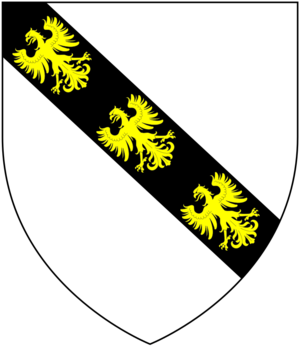Sir Edward Ernle, 3rd Baronet facts for kids
Sir Edward Ernle (born around 1673, died 1729) was an important English politician. He held the title of 3rd Baronet, which is a special inherited title. Sir Edward lived in places like Charborough in Dorset and Etchilhampton in Wiltshire. He was a member of the Whig political party. He served in the English and British Parliaments from 1695 to 1729. It was sometimes hard for him to find or keep a political position. He often needed his father-in-law's help to get elected in the town of Wareham.
Sir Edward Ernle: His Early Years
Sir Edward Ernle was a younger son in his family. His father was Edward Ernle. His grandfather was Sir Walter Ernle, who was the first Baronet of their family. Sir Edward's mother was Anne Ashe. Her father, Edward Ashe, was also a Member of Parliament (MP). This means both of Sir Edward's grandfathers were MPs. In 1690, Sir Edward became the 3rd Baronet after his brother, Walter, passed away. By 1698, he married Frances Erle. She was the only daughter of General Thomas Erle, another MP. After this marriage, Sir Edward became part of the Whig political party.
Sir Edward's Political Journey
Sir Edward Ernle started his political career in 1695. He was elected as a Member of Parliament (MP) for Devizes. An MP is a person chosen to represent a group of people in the government. In 1698, he was elected without anyone running against him for Wiltshire. He did not run in the first election of 1701. However, he often got elected for Wareham in special elections called "by-elections." A by-election happens when an MP leaves their seat before the next general election. He was first elected for Wareham on March 5, 1701.
Later in 1701, he was elected without opposition for Heytesbury. He could not find a seat in the 1702 election. But he was elected for Wareham again in a by-election in 1704. In 1705, he tried to become an MP for Wiltshire again but lost. He was asked to run for Marlborough in 1708. He was elected there after a close contest. In 1709, he voted to allow people from Palatine to become British citizens. In 1710, he voted to remove Dr. Sacheverell from his position. Sir Edward could not find a seat in the 1710 election. But he was elected for Wareham again in a by-election later that year. He did not run in the 1713 election.
In 1715, Sir Edward was elected as an MP for Portsmouth. His father-in-law helped him get this seat. In 1716, he voted for the Septennial Bill. This law changed how often elections were held, making them every seven years instead of three. In 1717, he joined a group of politicians who disagreed with the government. In 1719, he voted against changing some laws about religion. He also voted against the Peerage Bill, which would have limited the number of new noble titles. When his father-in-law died in 1720, Sir Edward gained control over who could be elected in Wareham. This is called "electoral interest." He then elected himself as MP for Wareham in both the 1722 and 1727 elections.
The End of His Life
Sir Edward Ernle passed away on January 31, 1729. He had two daughters but no sons. Because he had no male children, his title of Baronet went to a relative, Sir Walter Ernle, the 4th Baronet.
 | Stephanie Wilson |
 | Charles Bolden |
 | Ronald McNair |
 | Frederick D. Gregory |


